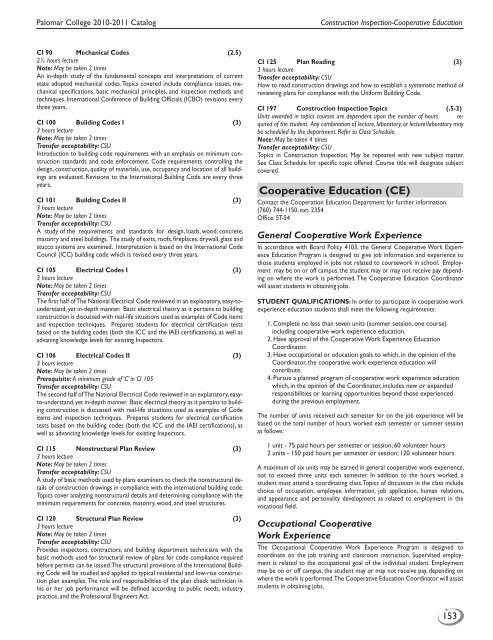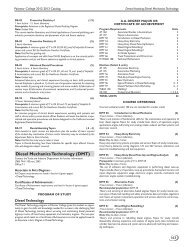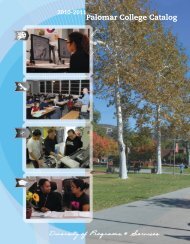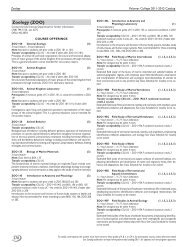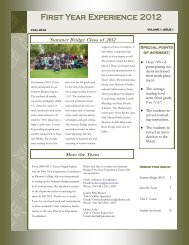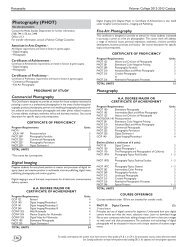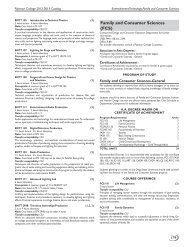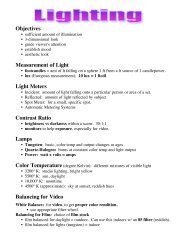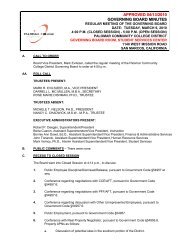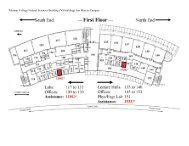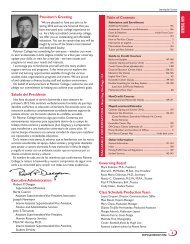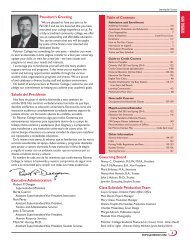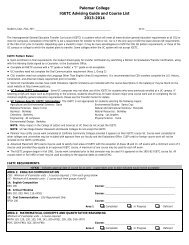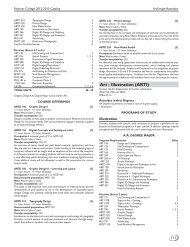Download the complete catalog - Palomar College
Download the complete catalog - Palomar College
Download the complete catalog - Palomar College
Create successful ePaper yourself
Turn your PDF publications into a flip-book with our unique Google optimized e-Paper software.
<strong>Palomar</strong> <strong>College</strong> 2010-2011 Catalog<br />
Construction Inspection-Cooperative Education<br />
CI 90 Mechanical Codes (2.5)<br />
2½ hours lecture<br />
Note: May be taken 2 times<br />
An in-depth study of <strong>the</strong> fundamental concepts and interpretations of current<br />
state adopted mechanical codes. Topics covered include compliance issues, mechanical<br />
specifications, basic mechanical principles, and inspection methods and<br />
techniques. International Conference of Building Officials (ICBO) revisions every<br />
three years.<br />
CI 100 Building Codes I (3)<br />
3 hours lecture<br />
Note: May be taken 2 times<br />
Transfer acceptability: CSU<br />
Introduction to building code requirements with an emphasis on minimum construction<br />
standards and code enforcement. Code requirements controlling <strong>the</strong><br />
design, construction, quality of materials, use, occupancy and location of all buildings<br />
are evaluated. Revisions to <strong>the</strong> International Building Code are every three<br />
years.<br />
CI 101 Building Codes II (3)<br />
3 hours lecture<br />
Note: May be taken 2 times<br />
Transfer acceptability: CSU<br />
A study of <strong>the</strong> requirements and standards for design, loads, wood, concrete,<br />
masonry and steel buildings. The study of exits, roofs, fireplaces, drywall, glass and<br />
stucco systems are examined. Interpretation is based on <strong>the</strong> International Code<br />
Council (ICC) building code which is revised every three years.<br />
CI 105 Electrical Codes I (3)<br />
3 hours lecture<br />
Note: May be taken 2 times<br />
Transfer acceptability: CSU<br />
The first half of The National Electrical Code reviewed in an explanatory, easy-tounderstand,<br />
yet in-depth manner. Basic electrical <strong>the</strong>ory as it pertains to building<br />
construction is discussed with real-life situations used as examples of Code items<br />
and inspection techniques. Prepares students for electrical certification tests<br />
based on <strong>the</strong> building codes (both <strong>the</strong> ICC and <strong>the</strong> IAEI certifications), as well as<br />
advaning knowledge levels for existing Inspectors.<br />
CI 106 Electrical Codes II (3)<br />
3 hours lecture<br />
Note: May be taken 2 times<br />
Prerequisite: A minimum grade of ‘C’ in CI 105<br />
Transfer acceptability: CSU<br />
The second half of The National Electrical Code reviewed in an explanatory, easyto-understand,<br />
yet in-depth manner. Basic electrical <strong>the</strong>ory as it pertains to building<br />
construction is discussed with real-life situations used as examples of Code<br />
items and inspection techniques. Prepares students for electrical certification<br />
tests based on <strong>the</strong> building codes (both <strong>the</strong> ICC and <strong>the</strong> IAEI certifications), as<br />
well as advancing knowledge levels for existing Inspectors.<br />
CI 115 Nonstructural Plan Review (3)<br />
3 hours lecture<br />
Note: May be taken 2 times<br />
Transfer acceptability: CSU<br />
A study of basic methods used by plans examiners to check <strong>the</strong> nonstructural details<br />
of construction drawings in compliance with <strong>the</strong> international building code.<br />
Topics cover analyzing nonstructural details and determining compliance with <strong>the</strong><br />
minimum requirements for concrete, masonry, wood, and steel structures.<br />
CI 120 Structural Plan Review (3)<br />
3 hours lecture<br />
Note: May be taken 2 times<br />
Transfer acceptability: CSU<br />
Provides inspectors, contractors, and building department technicians with <strong>the</strong><br />
basic methods used for structural review of plans for code compliance required<br />
before permits can be issued. The structural provisions of <strong>the</strong> International Building<br />
Code will be studied and applied to typical residential and low-rise construction<br />
plan examples. The role and responsibilities of <strong>the</strong> plan check technician in<br />
his or her job performance will be defined according to public needs, industry<br />
practice, and <strong>the</strong> Professional Engineers Act.<br />
CI 125 Plan Reading (3)<br />
3 hours lecture<br />
Transfer acceptability: CSU<br />
How to read construction drawings and how to establish a systematic method of<br />
reviewing plans for compliance with <strong>the</strong> Uniform Building Code.<br />
CI 197 Construction Inspection Topics (.5-3)<br />
Units awarded in topics courses are dependent upon <strong>the</strong> number of hours required<br />
of <strong>the</strong> student. Any combination of lecture, laboratory, or lecture/laboratory may<br />
be scheduled by <strong>the</strong> department. Refer to Class Schedule.<br />
Note: May be taken 4 times<br />
Transfer acceptability: CSU<br />
Topics in Construction Inspection. May be repeated with new subject matter.<br />
See Class Schedule for specific topic offered. Course title will designate subject<br />
covered.<br />
Cooperative Education (CE)<br />
Contact <strong>the</strong> Cooperation Education Department for fur<strong>the</strong>r information.<br />
(760) 744-1150, ext. 2354<br />
Office: ST-54<br />
General Cooperative Work Experience<br />
In accordance with Board Policy 4103, <strong>the</strong> General Cooperative Work Experience<br />
Education Program is designed to give job information and experience to<br />
those students employed in jobs not related to coursework in school. Employment<br />
may be on or off campus; <strong>the</strong> student may or may not receive pay depending<br />
on where <strong>the</strong> work is performed. The Cooperative Education Coordinator<br />
will assist students in obtaining jobs.<br />
STUDENT QUALIFICATIONS: In order to participate in cooperative work<br />
experience education students shall meet <strong>the</strong> following requirements:<br />
1. Complete no less than seven units (summer session, one course)<br />
including cooperative work experience education.<br />
2. Have approval of <strong>the</strong> Cooperative Work Experience Education<br />
Coordinator.<br />
3. Have occupational or education goals to which, in <strong>the</strong> opinion of <strong>the</strong><br />
Coordinator, <strong>the</strong> cooperative work experience education will<br />
contribute.<br />
4. Pursue a planned program of cooperative work experience education<br />
which, in <strong>the</strong> opinion of <strong>the</strong> Coordinator, includes new or expanded<br />
responsibilities or learning opportunities beyond those experienced<br />
during <strong>the</strong> previous employment.<br />
The number of units received each semester for on <strong>the</strong> job experience will be<br />
based on <strong>the</strong> total number of hours worked each semester or summer session<br />
as follows:<br />
1 unit - 75 paid hours per semester or session; 60 volunteer hours<br />
2 units - 150 paid hours per semester or session; 120 volunteer hours<br />
A maximum of six units may be earned in general cooperative work experience,<br />
not to exceed three units each semester. In addition to <strong>the</strong> hours worked, a<br />
student must attend a coordinating class. Topics of discussion in <strong>the</strong> class include<br />
choice of occupation, employee information, job application, human relations,<br />
and appearance and personality development as related to employment in <strong>the</strong><br />
vocational field.<br />
Occupational Cooperative<br />
Work Experience<br />
The Occupational Cooperative Work Experience Program is designed to<br />
coordinate on <strong>the</strong> job training and classroom instruction. Supervised employment<br />
is related to <strong>the</strong> occupational goal of <strong>the</strong> individual student. Employment<br />
may be on or off campus; <strong>the</strong> student may or may not receive pay, depending on<br />
where <strong>the</strong> work is performed. The Cooperative Education Coordinator will assist<br />
students in obtaining jobs.<br />
153


